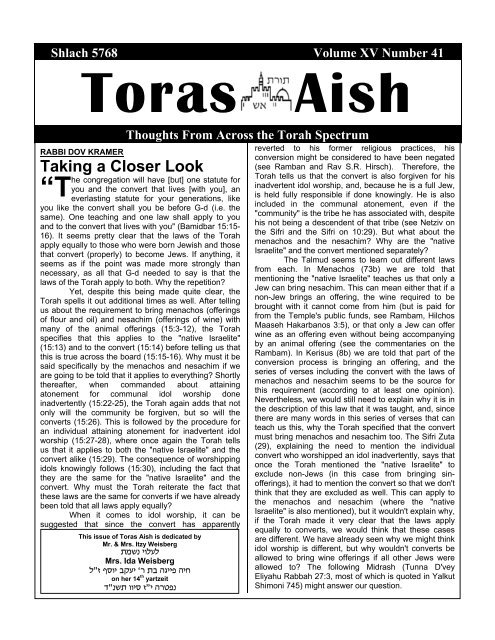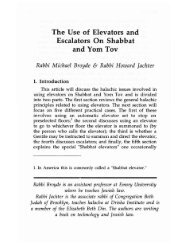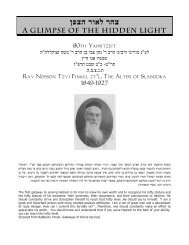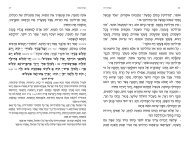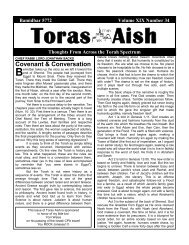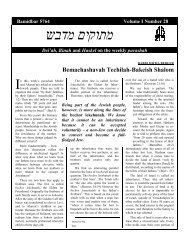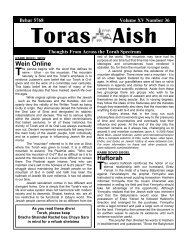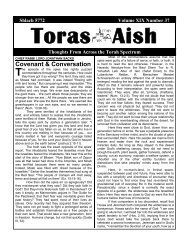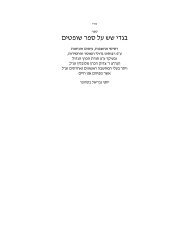You also want an ePaper? Increase the reach of your titles
YUMPU automatically turns print PDFs into web optimized ePapers that Google loves.
Shlach 5768 Volume XV Number 41<br />
<strong>Toras</strong> <strong>Aish</strong><br />
Thoughts From Across the Torah Spectrum<br />
RABBI DOV KRAMER<br />
Taking a Closer Look<br />
he congregation will have [but] one statute for<br />
“T<br />
you and the convert that lives [with you], an<br />
everlasting statute for your generations, like<br />
you like the convert shall you be before G-d (i.e. the<br />
same). One teaching and one law shall apply to you<br />
and to the convert that lives with you" (Bamidbar 15:15-<br />
16). It seems pretty clear that the laws of the Torah<br />
apply equally to those who were born Jewish and those<br />
that convert (properly) to become Jews. If anything, it<br />
seems as if the point was made more strongly than<br />
necessary, as all that G-d needed to say is that the<br />
laws of the Torah apply to both. Why the repetition?<br />
Yet, despite this being made quite clear, the<br />
Torah spells it out additional times as well. After telling<br />
us about the requirement to bring menachos (offerings<br />
of flour and oil) and nesachim (offerings of wine) with<br />
many of the animal offerings (15:3-12), the Torah<br />
specifies that this applies to the "native Israelite"<br />
(15:13) and to the convert (15:14) before telling us that<br />
this is true across the board (15:15-16). Why must it be<br />
said specifically by the menachos and nesachim if we<br />
are going to be told that it applies to everything? Shortly<br />
thereafter, when commanded about attaining<br />
atonement for communal idol worship done<br />
inadvertently (15:22-25), the Torah again adds that not<br />
only will the community be forgiven, but so will the<br />
converts (15:26). This is followed by the procedure for<br />
an individual attaining atonement for inadvertent idol<br />
worship (15:27-28), where once again the Torah tells<br />
us that it applies to both the "native Israelite" and the<br />
convert alike (15:29). The consequence of worshipping<br />
idols knowingly follows (15:30), including the fact that<br />
they are the same for the "native Israelite" and the<br />
convert. Why must the Torah reiterate the fact that<br />
these laws are the same for converts if we have already<br />
been told that all laws apply equally?<br />
When it comes to idol worship, it can be<br />
suggested that since the convert has apparently<br />
This issue of <strong>Toras</strong> <strong>Aish</strong> is dedicated by<br />
Mr. & Mrs. Itzy Weisberg<br />
unto!zwmBm<br />
Mrs. Ida Weisberg<br />
m”{!QTwz!crBz!‘s!uc!ihzzq!izI<br />
on her 14 th yartzeit<br />
e”otu!OwzT!{”z!isUqo<br />
reverted to his former religious practices, his<br />
conversion might be considered to have been negated<br />
(see Ramban and Rav S.R. Hirsch). Therefore, the<br />
Torah tells us that the convert is also forgiven for his<br />
inadvertent idol worship, and, because he is a full Jew,<br />
is held fully responsible if done knowingly. He is also<br />
included in the communal atonement, even if the<br />
"community" is the tribe he has associated with, despite<br />
his not being a descendent of that tribe (see Netziv on<br />
the Sifri and the Sifri on 10:29). But what about the<br />
menachos and the nesachim? Why are the "native<br />
Israelite" and the convert mentioned separately?<br />
The Talmud seems to learn out different laws<br />
from each. In Menachos (73b) we are told that<br />
mentioning the "native Israelite" teaches us that only a<br />
Jew can bring nesachim. This can mean either that if a<br />
non-Jew brings an offering, the wine required to be<br />
brought with it cannot come from him (but is paid for<br />
from the Temple's public funds, see Rambam, Hilchos<br />
Maaseh Hakarbanos 3:5), or that only a Jew can offer<br />
wine as an offering even without being accompanying<br />
by an animal offering (see the commentaries on the<br />
Rambam). In Kerisus (8b) we are told that part of the<br />
conversion process is bringing an offering, and the<br />
series of verses including the convert with the laws of<br />
menachos and nesachim seems to be the source for<br />
this requirement (according to at least one opinion).<br />
Nevertheless, we would still need to explain why it is in<br />
the description of this law that it was taught, and, since<br />
there are many words in this series of verses that can<br />
teach us this, why the Torah specified that the convert<br />
must bring menachos and nesachim too. The Sifri Zuta<br />
(29), explaining the need to mention the individual<br />
convert who worshipped an idol inadvertently, says that<br />
once the Torah mentioned the "native Israelite" to<br />
exclude non-Jews (in this case from bringing sinofferings),<br />
it had to mention the convert so that we don't<br />
think that they are excluded as well. This can apply to<br />
the menachos and nesachim (where the "native<br />
Israelite" is also mentioned), but it wouldn't explain why,<br />
if the Torah made it very clear that the laws apply<br />
equally to converts, we would think that these cases<br />
are different. We have already seen why we might think<br />
idol worship is different, but why wouldn't converts be<br />
allowed to bring wine offerings if all other Jews were<br />
allowed to? The following Midrash (Tunna D'vey<br />
Eliyahu Rabbah 27:3, most of which is quoted in Yalkut<br />
Shimoni 745) might answer our question.
2 <strong>Toras</strong> <strong>Aish</strong><br />
TORAS AISH IS A WEEKLY PARSHA<br />
NEWSLETTER DISTRIBUTED VIA EMAIL AND THE<br />
WORLD WIDE WEB AT HTTP://AISHDAS.ORG.<br />
FOR MORE INFO EMAIL YITZ@AISHDAS.ORG<br />
The material presented in this publication was collected from<br />
publicly available electronic mail, computer archives and the<br />
UseNet. It is being presented with the permission of the respective<br />
authors. <strong>Toras</strong> <strong>Aish</strong> is an independent publication, and does not<br />
necessarily reflect the views of any given synagogue.<br />
TO DEDICATE THIS NEWSLETTER PLEASE CALL<br />
973-472-0180 OR EMAIL YITZ@AISHDAS.ORG<br />
"And the nation mourned greatly' [upon hearing<br />
that they would not enter the Promised Land]<br />
(Bamidbar 14:39). At that time, G-d said to Moshe, 'go<br />
and appease them, for their hearts have left them' (i.e.<br />
they were depressed). [Moshe] said to Him, 'Master of<br />
the universe, how shall I appease them?' [He] said to<br />
him, 'go and appease them with words of Torah." The<br />
Midrash then quotes from the verses that Moshe was<br />
told to teach them, the commandments which we have<br />
been discussing, before continuing: "At that time there<br />
was a quarrel between the Israelites and the converts.<br />
G-d said to Moshe, 'Moshe, why are they quarreling?'<br />
[Moshe] said to Him, 'Master of the universe, you know<br />
[why].' [He said to him, 'haven't I already said to you<br />
(quoting Bamidbar 15:15-16) 'the congregation has one<br />
statute for you and for the convert (etc.), one teaching<br />
and one law shall [apply to you and to the convert that<br />
lives with you]?' From here (i.e. based on this) they (our<br />
sages, of blessed memory) said that there are three<br />
kinds of converts; there is a convert [who is] like our<br />
forefather Avraham, there is a convert that is like a<br />
donkey, [and] there is a convert that is like a non-Jew in<br />
every matter. The convert that is like a non-Jew in<br />
every matter is someone who has [disgusting foods,<br />
such as] animal carcasses, torn-apart animals, bugs<br />
and creepy crawly things in his house [who] says,<br />
'when will I convert and be among the Jews, whose<br />
cuisine is beautiful and have holidays and Sabbaths,<br />
and [then] these [disgusting foods] will no longer be in<br />
my house? I will force myself to convert.' In the end<br />
(after converting), he reverts to his previous ways, so<br />
suffering comes upon him for his own benefit, to save<br />
him from what he has done. G-d says (to the Jewish<br />
people), 'just as he loved you (i.e. your lifestyle), so<br />
should you love him,' as it says (Devarim 10:19) 'and<br />
you should love the convert.' The convert who is<br />
compared to a donkey is one who went to marry a<br />
Jewish woman [but she] told him 'I will not marry you<br />
until you convert.' He (the non-Jew) said, 'I will force<br />
myself and I will convert," [but] in the end reverted to<br />
his old ways. Suffering came upon him for his own<br />
benefit and to save him from what he had done. G-d<br />
says (to the Jewish people), 'my sons, just as this one<br />
sought to live in comfort among you, so should you give<br />
him [the opportunity to do so], as it says (Shemos<br />
22:20), 'you shall not oppress a convert.' The convert<br />
who is like our forefather Avraham is one who looked<br />
carefully at all the nations; once he saw that they all<br />
spoke well of the Jewish nation, he said, 'when will I<br />
convert and be like them and enter beneath the wings<br />
of the Divine Presence,' as it says (Yishaya 56:3-5),<br />
'and let the son of the stranger not say (etc.), so does<br />
G-d say to the barren ones (etc.), and I will give them in<br />
my house and within my walls (etc.).' (See Yallkut<br />
Shimoni 213, where the three types of converts are<br />
those that convert to marry, those that convert to take<br />
advantage of our supporting the poor, and those that<br />
convert for G-d's sake, with the latter being called equal<br />
to those born Jewish.)<br />
G-d had tried to preempt the fight between the<br />
Jews and the converts by specifically stating that the<br />
laws applied equally to both. Yet, for some reason, this<br />
wasn't enough, and, surprisingly, Moshe was unable to<br />
end the quarrel by simply pointing this out. Only after<br />
G-d reiterated that the words included in His<br />
commandments specifically addressed the issue did<br />
the fight end. But what was the fight about? Because<br />
the lesson learned from this episode is that all three<br />
types of converts remain Jewish even after reverting to<br />
their old ways, we can safely assume that this was<br />
precisely what the fight was about. Sure, they knew that<br />
the laws applied to converts too. But they thought that<br />
they only applied to converts that maintained their<br />
Judaism, not those that abandoned it.<br />
Many non-Jews had joined the Children of<br />
Israel when they left Egypt. They had seen the plagues<br />
sent against the Egyptian oppressors and wanted to<br />
join this new nation. However, this "erev rav," mixture of<br />
a multitude of other nations, had been nothing but<br />
trouble. They were primary in the sin of the golden calf,<br />
complaining about the heavenly manna, and protesting<br />
against trying to defeat the Canaanite nations and living<br />
in a land that demanded consistent closeness to G-d<br />
for survival. Could these "converts" really still be<br />
considered Jewish? They weren't being protected by<br />
the "clouds of glory," leading many to believe that they<br />
were not really Jewish. Yes, any convert that maintains<br />
his or her Judaism is a full Jew, but these<br />
troublemakers? Many didn't think so, and when G-d<br />
taught them laws that specifically excluded non-Jews,<br />
they thought it excluded these "pseudo-converts" as<br />
well. If they wanted to bring nesachim, the other Jews<br />
tried to stop them (according to those that say they<br />
brought nesachim in the Midbar). If they sinned<br />
inadvertently and tried to bring a sin offering, they were<br />
met with opposition. A quarrel erupted between the<br />
Jews who insisted they were not real converts and the<br />
converts, who insisted they were real Jews. Moshe was<br />
unable to quell the quarrel based on quoting G-d's<br />
commandments (as they could be referring only to<br />
"real" converts") until G-d told them that He meant all<br />
types of converts, even those that had (hopefully only<br />
temporarily) reverted to their non-Jewish ways.
<strong>Toras</strong> <strong>Aish</strong> 3<br />
Perhaps this is why, by the first of these<br />
commandments, G-d used three verses to emphasize<br />
that the convert is the same as the born-Jew. He knew<br />
that these laws being taught now would bring this issue<br />
to the forefront, and was teaching us that all [three<br />
types of] converts are included. © 2008 Rabbi D. Kramer<br />
RABBI AVI WEISS<br />
Shabbat Forshpeis<br />
hat is the purpose of wearing tzitzit, the ritual<br />
W<br />
fringes that are attached to the four cornered<br />
garment mentioned in our parsha? (Numbers<br />
15:37-41) Several classic answers come to mind.<br />
Some suggest the meaning lies in the tekhelet,<br />
the unique blue color found amongst the fringes. This<br />
color "is like the sea, the sea is like the sky and the sky<br />
like the throne of glory." (Menahot 43b) In other words,<br />
wearing tzitzit reminds us of G-d's presence.<br />
Still others suggest that the tzitzit remind us to<br />
commit to G-d's mitzvot. The numerical value of tzitzit,<br />
coupled with the number of knots and strings used to<br />
make these fringes, is 613, equal to the number of<br />
commandments. Beyond feeling G-d's presence, one,<br />
through the wearing of tzitzit, has a constant<br />
awareness of responsibility to G-d's law.<br />
Yet another thought comes to mind. The tzitzit<br />
remind us of the first garment recorded in the Torah,<br />
the one made by G-d for Adam and Eve after they ate<br />
from the tree in the Garden of Eden. Indeed, Adam and<br />
Eve disobeyed G-d, following the temptations of their<br />
eyes and heart. (Genesis 3:6) Here, G-d commands<br />
the wearing of fringes in order to avoid being seduced<br />
by our own hearts and eyes. (Numbers 15-39)<br />
Note also the use of the verb "tur" (to go after)<br />
found in the portion of fringes, (Numbers 15:39) and<br />
found when Moshe (Moses) sends the spies out to<br />
check out the land at the beginning of our parsha.<br />
(Numbers 13:16) Our In the case of the spies, they<br />
followed their inner whims and brought back an evil<br />
report. Here, in the paragraph of tzitzit, the Torah<br />
teaches us not to make the same mistake, not to be led<br />
astray.<br />
Ibn Ezra's comments about the prayer shawl<br />
worn during services now become clear. He insists that<br />
"it is much more necessary...to wear tzitzit during the<br />
rest of the day and not merely during prayers, in order<br />
to remember not to err and commit a sin, since during<br />
prayers [he will be in a holy frame of mind and] in any<br />
case, [will] not sin."<br />
In a sense, the prayer shawl serves a different<br />
function than that of the fringed garment worn all day.<br />
Wrapping ourselves with the prayer shawl helps us to<br />
feel G-d's love, G-d's protection and G-d's embrace.<br />
With the establishment of the State of Israel,<br />
the tzitzit has impacted upon our national psyche as<br />
well. David Wolfsohn records in his memoirs that during<br />
the first Zionist Congress, it was unanimously decided<br />
that the Israeli flag be blue and white, the same colors<br />
as the tzitzit. He writes, "This talit is our coat of arms,<br />
our emblem. Let us take out the talit and unfurl it before<br />
the eyes of Israel, before the eyes of all the nations."<br />
May it represent for us as individuals and as<br />
people the enveloping love from G-d and, at the same<br />
time, the continued need to remind ourselves of our<br />
goals and our collective focus. © 2008 Hebrew Institute of<br />
Riverdale & CJC-AMCHA. Rabbi Avi Weiss is Founder and<br />
Dean of Yeshivat Chovevei Torah, the Open Orthodox<br />
Rabbinical School, and Senior Rabbi of the Hebrew Institute<br />
of Riverdale.<br />
MACHON ZOMET<br />
Shabbat B’Shabbato<br />
by Rabbi Amnon Bazak, Yeshivat Har Etzion<br />
here is a problem with respect to the list of men<br />
sent to scout out the land. First, it is written, "For<br />
T<br />
the tribe of Efraim, Hoshaya Bin Nun" [Bamidbar<br />
13:8], and only afterwards is it written, "For the tribe of<br />
Yosef, for the tribe of Menasheh, Gadi Ben Sodi"<br />
[13:11]. This is difficult in two ways. First, it would seem<br />
most reasonable to list the tribe of Efraim after the<br />
words "for the tribe of Yosef," since this is relevant to<br />
both of the tribes of Yosef. This is indeed what appears<br />
in the beginning of the book of Bamidbar: "For the sons<br />
of Yosef: for Efraim, Elishama Ben Amihud; for<br />
Menasheh, Gamliel Ben Pedahtzur" [1:10]. In addition,<br />
the sequence of the tribes in the current list is<br />
problematic. In principle, it seems to be similar to the<br />
list in Chapter 1, based on the order of the births of the<br />
sons, divided according to the sequence of their births<br />
and their mothers: It starts with Leah's oldest children<br />
(without Levi, who is omitted from the lists)? Reuven,<br />
Shimon, Yehuda, and Yissachar, and ending with the<br />
four sons of the maidservants? Dan, Asher, Naftali, and<br />
Gad. However, the sequence of the four middle tribes is<br />
not clear. In Chapter 1, the order seems logical:<br />
Starting with Leah's fifth son, Zevulun, then Rachel's<br />
children? Yosef's sons Efraim and Menasheh, and then<br />
Binyamin. However, in this week's Torah portion Efraim<br />
is mentioned first, followed by Binyamin and Zevulun,<br />
with Menasheh at the end. What is the reason for this<br />
modified sequence?<br />
Evidently the two questions can be answered<br />
at the same time. The tribe of Efraim was moved<br />
forward in the list and separated from Menasheh<br />
because of the important status of its representative,<br />
Yehoshua Bin Nun. It can be assumed that from the<br />
very beginning Moshe feared what might happen in the<br />
future, which is the reason that he changed Hoshaya's<br />
name to Yehoshua (13:16? see Rashi, based on the<br />
Midrash: "Let G-d rescue you from the plans of the<br />
scouts"). The modified sequence was meant to<br />
emphasize that one man among the scouts was<br />
unique, the only one who was well known before the<br />
beginning of the affair? Yehoshua Bin Nun, Moshe's
4 <strong>Toras</strong> <strong>Aish</strong><br />
servant and the great warrior against Amalek. Moshe<br />
hoped that Yehoshua's presence among the other<br />
scouts would influence them not to be afraid of the<br />
existing inhabitants, including Amalek among others.<br />
This approach can also help explain another<br />
difficulty with the passage. When G-d turned to Moshe,<br />
He told him to send "one man for every tribe of their<br />
fathers, every one a leader among them" [13:1]. That is,<br />
we would have expected the list of scouts to consist of<br />
the leaders of the tribes, already known to us from the<br />
Torah portions of Bamidbar and Nasso. But instead of<br />
the tribal leaders, every "Nassi," Moshe sends<br />
"prominent men, leaders of Bnei Yisrael" [13:2]. Why<br />
didn't he send the real leaders of the tribes? Evidently<br />
this was because of Moshe's desire to send Yehoshua,<br />
something that he could not have done if he had sent<br />
the formal heads of the tribes.<br />
As we know, in the end Yehoshua was not<br />
successful in influencing the scouts and the nation as a<br />
whole. It was first necessary for the generation to be<br />
replaced before Yehoshua could assume the role of the<br />
leader of Bnei Yisrael and bring them into the land.<br />
RABBI SHLOMO RISKIN<br />
Shabbat Shalom<br />
nd G-d spoke to Moses saying 'Send men to<br />
“A<br />
scout the land of Canaan, which I am giving to<br />
the Israelite people...' " (Numbers 13:1-2) In<br />
the process of becoming a nation, the Jewish people<br />
committed any number of sins, but one in particular, as<br />
recorded in this week's portion, Shlach, dwarfs all<br />
others. The events are as follows: G-d commands<br />
Moses to appoint men to explore the land they will be<br />
settling-a reasonable request. And so Moses appoints<br />
12 princes to survey the land. After 40 days, they return<br />
with their report. As it turns out, the report is phrased in<br />
a way which sours the spirit of the people, and instead<br />
of being excited about the prospects of the new land,<br />
they let out a great cry. As a result of this wail, the<br />
Midrash tells us that G-d decides that if they think they<br />
have something to cry about now, let them wait. And so<br />
this date, the 9th of Av, becomes fixed in the Jewish<br />
calendar, reserved for mourning major national<br />
tragedies such as the destruction of both Temples, and<br />
the exile of the Jews from Spain 500 years ago.<br />
To understand the nature of their sin, we have<br />
to look more closely at the events recorded in the<br />
portion of Shlach. The report's opening phrase evokes<br />
the splendor of the promised land. "Indeed it's a land of<br />
milk and honey," (Numbers 13:27), an expression that<br />
has virtually become synonymous with the land of<br />
Israel. Displaying the enormous fruits of the land, we<br />
can safely conclude from their opening words that the<br />
spies had no doubts about the land's fertility. One<br />
would be hard-pressed to find in their entire report<br />
something against the land itself. True, "...the people<br />
living in the land are aggressive, and the cities are large<br />
and well-fortified. We also saw the giants there..."<br />
(13:28) is what they say, but are these words against<br />
the land? If the sin of the people wasn't against the<br />
land, perhaps it was against G-d? But they never<br />
actually say that G-d is wrong, nor do they deny that<br />
this is the land promised to them by G-d. In fact, using<br />
the expression 'milk and honey' reaffirms G-d's promise<br />
to Moses at the Burning Bush: "I will bring you to a land<br />
of milk and honey" (Exodus 3:8). If we cannot pin their<br />
rebellion against G-d or against the land, what are we<br />
left with?<br />
A clue can be found if we take a look at the<br />
verse which speaks of the land consuming its<br />
inhabitants. We read, "They began to speak badly<br />
about the land that they had explored. They told the<br />
Israelites, 'The land that we crossed to explore is a land<br />
that consumes its inhabitants. All the men we saw there<br />
were huge. While we were there we saw Nephilim... We<br />
felt like tiny grasshoppers. That's all that we were in<br />
their eyes" (Numbers 13:32-33).<br />
But if the land consumes its inhabitants, how is<br />
it possible that the people are huge? There should be<br />
no one alive, let alone giants and sons of the<br />
Nephillim?! As Nachmanides points out, (13:32) a poor,<br />
weak land cannot produce people strong in stature.<br />
Implicit in Nachnanides' words is that the land is not for<br />
average people. And this is the heart of the problem.<br />
Notice the sequence. 'There we saw the giants.<br />
We felt like grasshoppers,' followed by, 'That's all we<br />
were in their eyes' What this points to is a common<br />
phenomenon-how we see ourselves determines how<br />
others end up seeing us. If you're a grasshopper in<br />
someone else's eyes, obviously he'll crush you without<br />
a second thought, and once you think of yourself as a<br />
grasshopper, the rest of the world seconds the motion.<br />
The image of a grasshopper is striking, capturing the<br />
essence of exile: a chirping, tiny creature at the mercy<br />
of all; one who is easily crushed. 'We were like<br />
grasshoppers' means that the scouts, although princes<br />
of tribes, still think like slaves in Egypt, seeing<br />
themselves as despised, dependent creatures. How<br />
could they have possibly believed in themselves? And if<br />
one doesn't believe in oneself, one usually assimilates,<br />
gives oneself over to a higher power, decides either to<br />
return to Egypt - which Datan and Aviram always<br />
wanted to do - or to remain paralyzed and in-active in<br />
the desert. In accepting defeat rather than displaying<br />
defiance, the Jew is meekly and passively surrendering<br />
to fate as it 'hops' all over him.<br />
Now we see how in the scouts' sin lies the<br />
seed of the destruction of both Temples. Tragedy<br />
erupts not so much when others take a sudden dislike<br />
to us, but when we dislike ourselves and become<br />
paralyzed and passive as a result. The sin of the scouts<br />
is not in the terrible report they bring, but in their vision<br />
of themselves, a perception which becomes<br />
contagious, and which ends up as a self-fulfilling
<strong>Toras</strong> <strong>Aish</strong> 5<br />
prophecy of doom. As James Baldwin said so aptly, he<br />
could forgive America for enslaving the Blacks, but he<br />
could never forgive America for making the blacks feel<br />
that they were worthless, that they deserved to be<br />
slaves.<br />
And that's precisely what Egypt did to the<br />
Hebrews! In this century, we've taken giant steps<br />
toward rectifying this distorted vision, apparently more<br />
work needs to be done before the self-image of the<br />
grasshopper is gone. Then, even if we live 'in a land<br />
that consumes' its inhabitants, it only acts as a curse<br />
for those who live passive grasshoppery lives. But for<br />
the ex-grasshoppers, ready to take responsibility for the<br />
road to redemption, this land can really be a blessing.<br />
© 2008 Ohr Torah Institutions & Rabbi S. Riskin<br />
RABBI ABBA WAGENSBERG<br />
Between the Lines<br />
n this week's parsha, G-d tells Moses, "Send forth<br />
I<br />
men to spy out the land of Canaan that I am giving to<br />
the Jewish people" (Numbers 13:2). Logically, we<br />
would assume that this is the beginning of the story. In<br />
Parshat Devarim, however, when Moses reminisces<br />
about all the events that occurred during the Jewish<br />
people's 40 years in the desert, he reveals a different<br />
incentive for sending the spies: "And you all drew near<br />
to me and said, 'Let us send men ahead of us to spy<br />
out the land'" (Deut. 1:22). After the people made this<br />
request, Moses consulted G-d to determine what to do,<br />
and G-d allowed the expedition to take place.<br />
The Be'er Mayim Chaim wonders why Parshat<br />
Shlach picks up in the middle of the dialogue. Rather<br />
than the parsha beginning with G-d's response ("Send<br />
forth spies"), it should begin with the Jewish people's<br />
initial request! Furthermore, the Torah tells us that<br />
Moses sent "anashim" (men) to spy out the land<br />
(Numbers 13:3). Rashi explains that the word<br />
"anashim" refers to distinguished, important people. In<br />
fact, the men who were sent on this mission were the<br />
leaders of their tribes. This seems strange. If Moses<br />
wanted to spy out the land, why did he send the most<br />
eminent rabbis? It would have been more sensible to<br />
send out professional spies!<br />
As the story progresses, we see that most of<br />
the spies return with a negative report about the land.<br />
These people subsequently die in a horrific plague<br />
(Numbers 14:37; see Sotah 35a for the gory details).<br />
Obviously, the incident with the spies was considered<br />
to be a grave error. How, then, are we to understand<br />
this week's Haftorah, in which, 40 years after this<br />
incident, Joshua sends spies as well (Joshua 2)?! The<br />
spies in the time of Joshua are not condemned or<br />
punished; on the contrary, their behavior is seen as<br />
permissible or even commendable. What is the<br />
difference between the two situations?<br />
The Slonimer Rebbe, in Netivot Shalom,<br />
teaches that Moses and the Jewish people had<br />
different reasons for sending spies into the Land.<br />
Moses trusted G-d completely. He had no doubt that<br />
the land was good; he merely wanted to define its<br />
energy, to learn how to prepare for it in the best<br />
possible way. The Jewish people, on the other hand,<br />
had a different motivation. They were wary of entering<br />
unknown territory-even though it had been Divinely<br />
promised to them-and thus were primarily interested in<br />
investigating the physical and material nature of the<br />
Land.<br />
According to the commentator Ohr Gedaliyahu,<br />
the spies' challenge was whether to carry out Moses's<br />
mission or the Jewish people's. Whose agents were<br />
they going to be? Would they be guided by Moses's<br />
perspective, and look at the land through spiritual eyes,<br />
or would they instead see the Land from the physicallyoriented<br />
perspective of the Jewish people?<br />
This whole episode teaches us a valuable<br />
lesson. In our own lives, whenever we do a mitzvah, we<br />
must ask ourselves why we are doing it. Whose<br />
mission are we carrying out? Whose agents do we<br />
want to be? Are we doing the mitzvah for ourselves, or<br />
for G-d? Our focus makes all the difference. If we do a<br />
mitzvah for the right reasons, we grow in the right<br />
direction. If we do the same mitzvah, but for our own<br />
selfish motives (money, power, honor, etc.), we move in<br />
the wrong direction.<br />
Now we can understand why Parshat Shlach<br />
begins with G-d's response to the Jewish people,<br />
instead of their initial request. Since the people's<br />
request is not mentioned, we can learn that the spies<br />
were not intended to be guided by the people's<br />
motivations. The Talmud (Sotah 34b) also sees a hint<br />
to this idea in the wording of G-d's response to Moses,<br />
"Shlach lecha" (literally, "Send for yourself"). The<br />
Talmud interprets the seemingly superfluous word<br />
"lecha" as meaning "from your [Moses's] perspective."<br />
In other words, G-d excludes the perspective of the<br />
Jewish people from His command, implying that the<br />
spies should not go on their mission for the people's<br />
reasons.<br />
This explains why Moses selected spiritual<br />
leaders for this mission instead of professional spies.<br />
Moses was not interested in physically spying out the<br />
Land; rather, he wanted to investigate the land's<br />
spiritual makeup. The best-equipped people for such a<br />
task were those steeped in spirituality.<br />
Now we can also understand the difference<br />
between the incident with the spies in this week's<br />
parsha and the spies who were sent in the time of<br />
Joshua. In Parshat Shlach, when the spies return, the<br />
Torah tells us, "The spies came... to report to the<br />
Jewish people" (Numbers 13:26). This verse indicates<br />
that the spies were primarily focused on doing the will<br />
of the people. In the time of Joshua, however, the verse<br />
tells us that the spies "came to Joshua and told him all<br />
that had happened to them" (Josh. 2:23). The spies
6 <strong>Toras</strong> <strong>Aish</strong><br />
sent by Joshua reported back to him alone. This<br />
indicates their pure motivations.<br />
May we be blessed to go in the ways of the<br />
righteous, and follow the ways of G-d, in order to<br />
ensure that all of our actions are done for the right<br />
reasons. © 2008 Rabbi A. Wagensberg & aish.com<br />
RABBI ZEV LEFF<br />
Outlooks & Insights<br />
oses renamed Hoshea son of Nun, 'Joshua.'"<br />
“M<br />
(Numbers 13:16) Prior to the departure of the<br />
12 spies, Moses changed the name of his<br />
disciple Hoshea to Joshua. That changed contained<br />
within it a prayer that G-d save Joshua from the plot of<br />
the spies. It remains to be explained, however, why<br />
Moses agreed to send the spies in the first place if he<br />
was aware of a plot to malign the Land of Israel. In<br />
addition, why did he pray for Joshua alone and not for<br />
Calev and the others?<br />
The Vilna Gaon (in Emuna VeHashgacha)<br />
explains that there are three ways in which G-d<br />
manifests His Divine Providence. The first is called<br />
hanhaga nissis, the manifestation of overt miracles.<br />
This was the manner in which G-d related to us during<br />
the 40 years in the desert. A Cloud of Glory<br />
accompanied us by day and a pillar of fire by night; we<br />
ate the Heaven-sent manna; and our thirst was<br />
quenched by water from a well that flowed from a rock,<br />
which accompanied us on our journey. When we<br />
sinned, Divine retribution followed immediately in an<br />
unmistakable fashion.<br />
The second type of Divine Providence is called<br />
hanhagas nissim nistarim. In this stage, G-d relates to<br />
us through hidden miracles. This describes the manner<br />
in which G-d related to us in the Land of Israel, prior to<br />
our exile. At that time, a direct relationship between<br />
nature and Torah observance was evident. When we<br />
kept the mitzvot and toiled in Torah, the rains fell in<br />
their proper times and amounts, health and wealth were<br />
our lot; and when we sinned, drought and famine<br />
followed. Since our exile from Israel, we have<br />
experienced the third type of Divine Providence, hester<br />
panim. In this stage, G-d hides His face from us and<br />
our ability to see G-d's Divine Providence in the world<br />
becomes impaired.<br />
The Vilna Gaon explains that the various<br />
manifestations of Divine Providence differ only in our<br />
perception. In reality, G-d controls and guides the world<br />
equally in a period when we experience Divine miracles<br />
as a matter of course, and in a period where all we see<br />
is the workings of nature. G-d merely hides His face in<br />
the latter period.<br />
Our forefathers in the desert were aware that<br />
upon entering the Land of Israel, the manner in which<br />
G-d related to us would change from one of open<br />
miracles to one of miracles within nature. Manna would<br />
no longer descend from the heavens; rather, we would<br />
plow and plant and harvest in order to eat. A well would<br />
no longer accompany us; rather, we would depend on<br />
rainfall to quench our thirst. Their mistake, however,<br />
was to reason that if their lives were apparently subject<br />
to the same natural order as the rest of the world, then<br />
their ultimate success or failure depended on their own<br />
military prowess. This was a grievous error.<br />
It was this mistaken outlook from which Moses<br />
prayed that Joshua would be spared. Moses reasoned<br />
that he could better prove to the people their mistake by<br />
letting them actually see the Land of Israel. He hoped<br />
that they would realize the impossibility of conquering<br />
Israel with their own might. And yet G-d had assured<br />
them that they would in fact conquer the land. They<br />
should have concluded that G-d obviously planned to<br />
continue aiding them, even if in a less openly<br />
miraculous fashion.<br />
Joshua, who was to lead the Jewish people<br />
during this new stage of Divine Providence, required a<br />
special prayer that he be spared from a distorted<br />
perspective on nature. The name Joshua signifies-<br />
Hashem Yoshiah-May G-d save you. The Divine name<br />
represents the synthesis between the apparent cause<br />
and effect of the natural world and G-d's intimate<br />
spiritual link with man- the yud represents G-d's<br />
creation of the World to Come, and the heh the creation<br />
of this world. Moses prayed that Joshua see nature as<br />
nothing more than a veil to G-d's direct Divine<br />
Providence. Hence Nature-HaTevah- and Elokim are<br />
numerically equivalent.<br />
Moses told the spies to bring back the fruits of<br />
the Land of Israel precisely to drive home the lesson<br />
that they would still be completely dependent on G-d's<br />
beneficence. Without water, fruits cannot grow, and in<br />
Israel water depends solely on rainfall, which is<br />
obviously not in man's hands. Moses wanted them to<br />
recognize that even though there would be more effort<br />
required to secure a livelihood in the natural setting of<br />
Israel than in the desert, the final result would depend<br />
no less on G-d than when the manna descended<br />
directly from Heaven.<br />
Unfortunately, only Calev and Joshua grasped<br />
this point. The others saw only that it was beyond their<br />
"natural" abilities to conquer the land, and concluded<br />
that even G-d Himself, as it were, could not help them<br />
since He had chosen to let them be governed by the<br />
natural order. This reasoning led to the purposeless<br />
crying on the night of Tisha B'Av when the people wept<br />
as a sign of hopelessness.<br />
To correct the purposeless tears of that Tisha<br />
B'Av eve in the desert, our Holy Temples were<br />
destroyed on Tisha B'Av and we were thrust into exile<br />
where we would come to see clearly our dependence<br />
on G-d. But rather than crying over our helplessness,<br />
our tears on Tisha B'Av must proclaim: "G-d, You<br />
promised that we would be redeemed from this exile.
<strong>Toras</strong> <strong>Aish</strong> 7<br />
We cannot achieve this redemption through our own<br />
efforts. Therefore You must redeem us."<br />
Rabbi Yerucham Levovitz, the great Mirrer<br />
Mashgiach, explains the Mishnah at the end of Sotah to<br />
mean that Moshiach will not come so long as we<br />
attribute our successes and failures to "natural" causes.<br />
As long as we look for political, economic and<br />
sociological explanations of world events, and excuse<br />
ourselves from Torah learning on the grounds that we<br />
must earn a livelihood, we will not merit an end to our<br />
exile.<br />
Let us strengthen our faith and trust in G-d so<br />
that we can finally dry the tears of Tisha B'Av and<br />
celebrate it with jubilation, for a Redeemer will have<br />
come to Zion. © 2008 Rabbi Z. Leff & aish.com<br />
RABBI ADAM LEIBERMAN<br />
A Life Lesson<br />
hile in the desert, the Jewish people wanted to<br />
W<br />
send spies into the Land of Israel to make sure<br />
that the land was safe to enter. The spies came<br />
back with a very negative report on the land's condition<br />
and the spies boldly said: "...we were like grasshoppers<br />
in our eyes, and so we were like in their eyes!"<br />
(Numbers 13:33)<br />
The spies strongly felt that the current<br />
inhabitants in the Land of Israel viewed them as people<br />
who were very small in size and who could easily be<br />
conquered. But this isn't how it was. The spies first felt<br />
that they were like grasshoppers in their own eyes.<br />
Only after they themselves felt that they were like<br />
grasshoppers did they believe that others perceived<br />
them as grasshoppers in their eyes.<br />
This extra piece of information can have a lifechanging<br />
impact on all of us. People will always<br />
perceive you exactly how you perceive yourself.<br />
Most people go through life trying to have<br />
others think of them in a certain way. Their daily goal<br />
literally consists of making sure everyone has a certain<br />
impression of them. But the real you is one who stares<br />
back at you in the mirror. That's you-and there's no<br />
amount of acting that will ever change that.<br />
Ironically, the way you see yourself is the exact<br />
way in which you'll think how others feel about you. And<br />
the only way to ever change how you think others view<br />
you is to actually change the way in which you see<br />
yourself. Doing this can make all the difference in the<br />
world. Remember, as long as you really think of<br />
yourself as a grasshopper, you will walk around<br />
thinking others view you the same way. Whether you<br />
think of yourself as insecure, unattractive, unambitious,<br />
or any other negative belief- you will live with the reality<br />
that others view you in the exact same way.<br />
The only way ever to change how you think<br />
others perceive you is to first change the way you see<br />
yourself. The secret isn't to get them to change their<br />
view of you. Rather, it's to change the way you see<br />
yourself and then the world will see you in this whole<br />
new light.<br />
The quick and simple way to immediately<br />
change how you see yourself is done with action-not by<br />
thought or desire. Start acting in a manner consistent<br />
with who you want to become, you'll then see yourself<br />
more and more like this person, and you'll "notice" how<br />
all those around you seems to just naturally follow your<br />
lead. © 2008 Rabbi A. Lieberman & aish.com<br />
RABBI BORUCH LEFF<br />
Kol Yaakov<br />
erry and his wife, Karen, were facing a crisis. They<br />
J<br />
had moved to Wheeling, West Virginia from the<br />
suburbs of Chicago just 2 years before, due to a<br />
promotion Jerry had received in his firm. They realized<br />
now that it was a colossal and tragic mistake. Not<br />
because of Jerry's job-that was a tremendous success.<br />
The problem was Karen and the kids. They knew that<br />
the biggest disadvantage to Wheeling was the lack of<br />
Jewish education and social circles; there were no day<br />
schools or synagogues in Wheeling. But they thought<br />
they would be able to withstand the four years that<br />
Jerry's assignment in Wheeling was supposed to last.<br />
But now their children had told them that they<br />
no longer wish to be Jewish! This was after just two<br />
years away from other Jewish kids. What would<br />
happen after another two years of Wheeling? This was<br />
in addition to Karen and Jerry's 'hermit' social situation<br />
ever since they had left their group of Jewish friends in<br />
Chicago. Jerry and Karen wondered: "How does G-d<br />
look at us now?" They had been given a challenge two<br />
years ago whether to take the Wheeling offer or not and<br />
they firmly believed now that they had failed the test.<br />
How would G-d relate to them now, after they had<br />
ruined "His Master Plan" for their lives and made such<br />
a terrible mistake?<br />
The answer is in this week's Torah portion,<br />
Shlach: "Send for YOURSELF, men, and let them spy<br />
out the Land of Canaan that I am giving to the Children<br />
of Israel." (Bamidbar 13:2). Rashi comments: "For<br />
yourself, meaning according to your own counsel. I<br />
(G-d) am not commanding you to do so. If you want,<br />
you can send them."<br />
G-d acquiesces to the Jewish People's request<br />
to send spies but not enthusiastically: "I had told them<br />
that the Land of Israel was good (but they do not trust<br />
Me)." (Rashi 13:2).<br />
G-d is not thrilled with the Jewish people's wish<br />
to send spies to confirm that the Land of Israel is<br />
conquerable and that it is indeed the land of "flowing<br />
milk and honey." But He allows it. G-d's lack of<br />
excitement towards the idea of sending the spies<br />
foreshadows the rest of the events of the Parsha which<br />
describes how the spies' mission and the people's<br />
reaction to their report caused the eventual death of the<br />
entire generation and the 40-year sojourn in the desert.
8 <strong>Toras</strong> <strong>Aish</strong><br />
All this leaves us with many questions. First<br />
and foremost, if G-d hinted to His displeasure of<br />
sending spies and Moshe knew that G-d was not happy<br />
with the notion, why would Moshe go along with it? We<br />
even find (in Devarim 1:26) that Moshe was pleased<br />
with the idea. How could Moshe send spies if he knows<br />
G-d only allows it in terms of "shelach lecha"-"send for<br />
yourself, I am not commanding you"? It's one thing to<br />
ignore our mother or father when they tell us, "I don't<br />
think it's a good idea but do it if you want," but it's quite<br />
another to ignore G-d's advice!<br />
Second, why would G-d "set up" and trap the<br />
Jewish people? If He knows that sending spies will only<br />
lead to disaster, why wouldn't He protect His nation<br />
from it?<br />
Finally, it seems unfair for G-d to be so<br />
exacting in His words, "Send for YOURSELF" in order<br />
to distance Himself from the command. After all is said<br />
and done, G-d is the one who tells Moshe to send<br />
spies. It is a commandment. What then is the deeper<br />
message of "for YOURSELF" if the bottom line is that it<br />
is still a commandment?<br />
The answer teaches us a tremendous<br />
fundamental of Jewish living and philosophy. G-d deals<br />
with us where we are at, not where He is. Sending the<br />
spies was not automatically going to lead to the<br />
downfall of the Jewish people. It was the proper course<br />
of action under the circumstances. G-d was saying: "I<br />
wouldn't have suggested that you send spies to<br />
investigate the status of the land. I expected you to<br />
trust Me and conquer and settle the land, sight unseen.<br />
This is exactly the same kind of trust that you<br />
demonstrated once before at Sinai. (See Kol Yaakov,<br />
"G-d Knows Best" http://www.aish.com/<br />
torahportion/kolyaakov/G-d Knows Best.asp) You<br />
shouldn't need the spies. But once you have chosen<br />
this route, then you MUST send them. It is now proper<br />
for you to send them since you have lowered your<br />
spiritual level and the level of trust you have in Me. In<br />
fact, if you don't send the spies now, but think you can<br />
rely on trust in Me, you will not succeed."<br />
It is true that a very holy and righteous person<br />
who trusts in G-d can simply pray and wish for his<br />
physical sustenance and he/she will never have to work<br />
for it. Money will appear somehow on his doorstep<br />
whenever he/she needs it. But for those of us not on<br />
this supreme level (99.9999% of us!), it would not only<br />
be unwise to rely on G-d alone for our sustenance, it<br />
would be a transgression. We must put forth effort in<br />
order to achieve results, including "making a livelihood."<br />
The Jewish people, as well, put themselves in<br />
a position where the only course of action they could<br />
have taken was to send spies. They displayed their lack<br />
of complete trust in G-d and had to go about things in<br />
the regular ways of making war and conquering land,<br />
which is to send spies. G-d was not advising them not<br />
to send spies in His phrase of, "for YOURSELF"; rather,<br />
He was just voicing His disappointment that the Jewish<br />
people could not raise themselves to the level of<br />
complete trust in G-d.<br />
G-d deals with us where we are at, not where<br />
He is. Did G-d want the Jews to send the spies?<br />
Certainly, not. Did the Jews make a fatal mistake in<br />
descending to the level of having to send them?<br />
Definitely, yes. But G-d reacted to the Jews' mistake,<br />
not with abandonment and disdain, but with a new task<br />
and mission for them. They now had to face the danger<br />
and the challenge of the spies' report and how they<br />
would deal with it. (They unfortunately failed this test as<br />
well.)<br />
Whenever we use our free will to make<br />
decisions that go against G-d's original plans and<br />
wishes, He doesn't leave us to grope through life's<br />
difficulties alone. He responds with a brand new list of<br />
challenges and tests for us to pass. This does not<br />
mean that there is no accountability for our choices and<br />
actions. G-d judges us and records all our failures. This<br />
of course leads to consequences and punishments. But<br />
even if we have chosen a wrong path, He is still with us<br />
throughout our lives.<br />
We set the playing field of our lives and<br />
hopefully it is in line with His desires for us. But even if<br />
it is not, G-d shows up at the "new stadium" that we<br />
have built for ourselves and writes a brand new "gameplan."<br />
He may now have very different expectations for<br />
us than He once did, but great expectations He has.<br />
Now we return to Jerry and Karen and their<br />
Wheeling decision. It does seem like the choice of<br />
Wheeling was a very bad one. But G-d does indeed<br />
relate to them in the same way, even after they had<br />
ruined "His Master Plan" for their lives and made such<br />
a terrible mistake. He responds flexibly to the situation,<br />
lowering His expectations and range of decisions that<br />
are to be made. In Chicago, Jerry and Karen's<br />
challenges may have been to pray at synagogue every<br />
week and to enroll their kids in a Torah school. In<br />
Wheeling, their challenge may involve studying Torah<br />
with their kids daily and discussing Jewish issues with<br />
them. (It may now also encompass making plans to<br />
leave Wheeling.)<br />
G-d gave over the course of our destinies to<br />
our own free will and decision-making. (There are times<br />
when He "steps in" to direct us with His Providence, but<br />
this is not the norm.)<br />
Rest assured, though, that no matter what<br />
happens and no matter what we decide, He is right<br />
there with us at all times. © 2008 Rabbi B. Leff and<br />
torah.org<br />
www.aish.com


